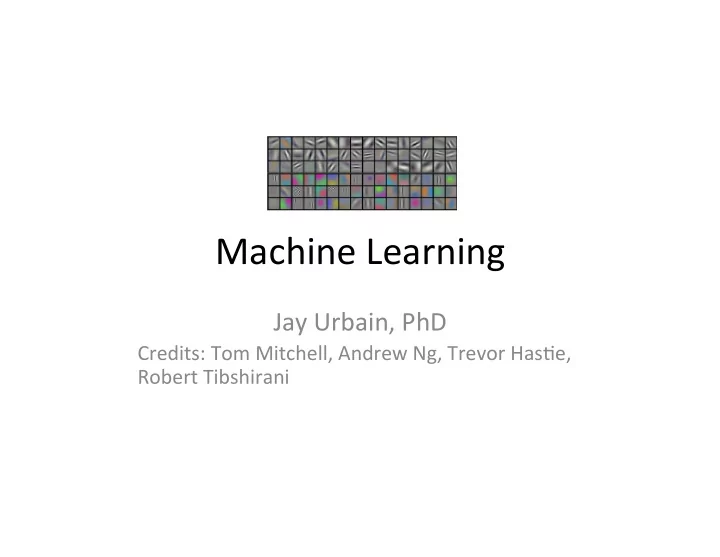

Machine ¡Learning ¡ Jay ¡Urbain, ¡PhD ¡ Credits: ¡Tom ¡Mitchell, ¡Andrew ¡Ng, ¡Trevor ¡HasAe, ¡ Robert ¡Tibshirani ¡
Machine ¡Learning ¡(ML) ¡ • Research ¡and ¡development ¡of ¡algorithms ¡that ¡can ¡learn ¡from ¡ and ¡make ¡predicAons ¡on ¡data. ¡ ¡ • ML ¡algorithms ¡build ¡a ¡model ¡from ¡example ¡inputs ¡in ¡order ¡to ¡ make ¡data-‑driven ¡predicAons ¡or ¡decisions, ¡rather ¡than ¡ following ¡staAc ¡program ¡instrucAons. ¡
SPAM
General ¡algorithm ¡for ¡learning? ¡ hLp://www.wicab.com/ brainport-‑v100 ¡ ¡
Machine ¡Learning ¡ -‑ ¡Grew ¡out ¡of ¡work ¡in ¡AI ¡and ¡staAsAcal ¡modeling ¡ -‑ ¡New ¡capability ¡for ¡computers ¡ ¡ ¡ Examples: ¡ ¡ -‑ ¡Data ¡mining ¡ ¡ Large ¡datasets ¡from ¡growth ¡of ¡automaAon/web. ¡ ¡ ¡ E.g., ¡Web ¡click ¡data, ¡medical ¡records, ¡biology, ¡sensor ¡data ¡ -‑ ¡ApplicaAons ¡that ¡can’t ¡easily ¡be ¡programmed ¡by ¡hand. ¡ E.g., ¡Autonomous ¡helicopter, ¡handwriAng ¡recogniAon, ¡most ¡of ¡Natural ¡ Language ¡Processing ¡(NLP), ¡Image ¡RecogniAon. ¡ ¡ -‑ ¡Self-‑customizing ¡programs ¡ E.g., ¡Amazon, ¡NeXlix ¡product ¡recommendaAons ¡ -‑ ¡Understanding ¡human ¡learning ¡(brain, ¡real ¡AI). ¡ ¡
Machine ¡Learning ¡in ¡the ¡News ¡ Natural ¡language ¡processing ¡ • hLp://www.aaai.org/Magazine/Watson/watson.php ¡ ¡ – Voice ¡recogniAon ¡ – Extract ¡knowledge ¡from ¡text ¡(i2b2) ¡ – Open ¡domain ¡quesAon/answering ¡ StaAsAcal ¡modeling ¡ • – Maximum ¡likelihood ¡given ¡context ¡(lbp) ¡ Fusion ¡ • – Integrate ¡and ¡rank ¡results ¡from ¡mulAple ¡ learning ¡methods ¡(search) ¡ Online ¡Machine ¡Learning ¡ • "Building ¡Watson: ¡An ¡Overview ¡of ¡the ¡ DeepQA ¡Project," ¡wriLen ¡by ¡the ¡IBM ¡Watson ¡ – Watson ¡becomes ¡smarter ¡as ¡it ¡tries ¡to ¡ Research ¡Team, ¡led ¡by ¡David ¡Ferucci. ¡ answer ¡quesAons ¡— ¡and ¡to ¡learn ¡as ¡it ¡gets ¡ them ¡right ¡or ¡wrong. ¡ hLps://www.youtube.com/watch?v=WFR3lOm_xhE ¡ ¡
InformaAon ¡Retrieval, ¡ Natural ¡Language ¡Processing ¡
Learn ¡PredicAve ¡Models ¡from ¡Data ¡ hLp://fivethirtyeight.com/features/how-‑the-‑fivethirtyeight-‑senate-‑forecast-‑model-‑works/ ¡ ¡
Image ¡ClassificaAon ¡ ConvoluAonal ¡Neural ¡Networks ¡are ¡are ¡a ¡ • special ¡kind ¡of ¡mulA-‑layer ¡neural ¡ networks. ¡ ¡ • Use ¡back-‑propagaAon ¡algorithm. ¡ ¡ • Architecture ¡of ¡network ¡designed ¡to ¡ recognize ¡visual ¡paLerns ¡directly ¡from ¡ pixel ¡images ¡with ¡minimal ¡preprocessing. ¡ ¡ ¡ • Can ¡recognize ¡paLerns ¡with ¡extreme ¡ variability ¡(such ¡as ¡handwriLen ¡ characters), ¡and ¡with ¡robustness ¡to ¡ hLp://yann.lecun.com/exdb/lenet/ ¡ ¡ distorAons ¡and ¡simple ¡geometric ¡ ¡ transformaAons. ¡ ¡
Image ¡ClassificaAon: ¡state ¡of ¡the ¡art ¡ Deep ¡learning ¡using ¡convoluAon ¡networks. ¡ • Trained ¡a ¡large, ¡deep ¡convoluAonal ¡neural ¡network ¡to ¡classify ¡the ¡1.2 ¡ • million ¡high-‑resoluAon ¡images ¡using ¡GPUs. ¡ hLp://www.cs.toronto.edu/~fritz/absps/imagenet.pdf ¡ ¡ •
Reinforcement ¡Learning ¡ hLp://heli.stanford.edu/ ¡ ¡ • – Autonomous ¡Helicopter ¡AerobaAcs ¡through ¡ApprenAceship ¡Learning, ¡Pieter ¡Abbeel, ¡ Adam ¡Coates, ¡and ¡Andrew ¡Y. ¡Ng. ¡IJRR, ¡2010. ¡ ¡ – Learning ¡for ¡Control ¡from ¡MulAple ¡DemonstraAons, ¡Adam ¡Coates, ¡Pieter ¡Abbeel, ¡and ¡ Andrew ¡Y. ¡Ng. ¡ICML, ¡2008. ¡ hLps://www.youtube.com/watch?feature=player_embedded&v=VCdxqn0fcnE ¡ ¡ ¡ ¡
Recommender ¡Systems ¡ • Content ¡filtering ¡ hLp://www.neXlixprize.com/ ¡ ¡ • CollaboraAve ¡filtering ¡
Machine ¡Learning ¡definiAon ¡ Arthur ¡Samuel ¡(1959). ¡Machine ¡Learning: ¡Field ¡of ¡study ¡that ¡gives ¡ • computers ¡the ¡ability ¡to ¡learn ¡without ¡being ¡explicitly ¡programmed. ¡ ¡ Tom ¡Mitchell ¡(1998) ¡Well-‑posed ¡Learning ¡Problem: ¡A ¡computer ¡ • program ¡is ¡said ¡to ¡ learn ¡from ¡experience ¡E ¡with ¡respect ¡to ¡some ¡task ¡ T ¡and ¡some ¡performance ¡measure ¡P, ¡if ¡its ¡performance ¡on ¡T, ¡as ¡ measured ¡by ¡P, ¡improves ¡with ¡experience ¡E. ¡ ¡
“A ¡computer ¡program ¡is ¡said ¡to ¡ learn ¡from ¡experience ¡E ¡with ¡respect ¡to ¡ some ¡task ¡T ¡and ¡some ¡performance ¡measure ¡P, ¡if ¡its ¡performance ¡on ¡T, ¡ as ¡measured ¡by ¡P, ¡improves ¡with ¡experience ¡E.” ¡ Suppose ¡your ¡email ¡program ¡watches ¡which ¡emails ¡you ¡do ¡or ¡do ¡ not ¡mark ¡as ¡spam, ¡and ¡based ¡on ¡that ¡learns ¡how ¡to ¡beLer ¡filter ¡ spam. ¡ ¡What ¡is ¡the ¡task ¡T ¡in ¡this ¡senng? ¡ ¡ ¡ Classifying ¡emails ¡as ¡spam ¡or ¡not ¡spam. ¡ ¡ Watching ¡you ¡label ¡emails ¡as ¡spam ¡or ¡not ¡spam. ¡ ¡ The ¡number ¡(or ¡fracAon) ¡of ¡emails ¡correctly ¡classified ¡as ¡spam/not ¡spam. ¡ ¡ None ¡of ¡the ¡above—this ¡is ¡not ¡a ¡machine ¡learning ¡problem. ¡
Machine ¡learning ¡algorithms: ¡ -‑ Supervised ¡learning ¡ -‑ Unsupervised ¡learning ¡ -‑ Reinforcement ¡learning ¡ -‑ Semi-‑supervised ¡ -‑ Etc. ¡ Applying ¡learning ¡algorithms. ¡ ¡
Housing ¡price ¡predicAon. ¡Regression. ¡ ¡ 400 ¡ 300 ¡ Price ¡($) ¡ ¡ 200 ¡ in ¡1000’s ¡ 100 ¡ 0 ¡ 0 ¡ 500 ¡ 1000 ¡ 1500 ¡ 2000 ¡ 2500 ¡ Size ¡in ¡feet 2 ¡ ¡ Supervised ¡Learning ¡ Regression: ¡Predict ¡conAnuous ¡ valued ¡output ¡(price) ¡ “right ¡answers” ¡given ¡
Breast ¡cancer ¡(malignant, ¡benign) ¡ ClassificaAon ¡ 1(Y) ¡ Discrete ¡valued ¡ Malignant? ¡ output ¡(0 ¡or ¡1) ¡ 0(N) ¡ Tumor ¡Size ¡
-‑ Clump ¡Thickness ¡ -‑ Uniformity ¡of ¡Cell ¡Size ¡ -‑ Uniformity ¡of ¡Cell ¡Shape ¡ Age ¡ … ¡ Tumor ¡Size ¡
You’re ¡running ¡a ¡company, ¡and ¡you ¡want ¡to ¡develop ¡learning ¡algorithms ¡to ¡address ¡ each ¡of ¡two ¡problems. ¡ ¡ Problem ¡1: ¡You ¡have ¡a ¡large ¡inventory ¡of ¡idenAcal ¡items. ¡ ¡You ¡want ¡to ¡predict ¡ how ¡ many ¡of ¡these ¡items ¡will ¡sell ¡over ¡the ¡next ¡3 ¡months. ¡ Problem ¡2: ¡You’d ¡like ¡somware ¡to ¡examine ¡individual ¡customer ¡accounts, ¡and ¡for ¡each ¡ account ¡decide ¡if ¡it ¡has ¡been ¡hacked. ¡ ¡ Should ¡you ¡treat ¡these ¡as ¡classificaAon ¡or ¡as ¡regression ¡problems? ¡ ¡ Treat ¡both ¡as ¡classificaAon ¡problems. ¡ ¡ Treat ¡problem ¡1 ¡as ¡a ¡classificaAon ¡problem, ¡problem ¡2 ¡as ¡a ¡regression ¡problem. ¡ ¡ Treat ¡problem ¡1 ¡as ¡a ¡regression ¡problem, ¡problem ¡2 ¡as ¡a ¡classificaAon ¡problem. ¡ ¡ Treat ¡both ¡as ¡regression ¡problems. ¡ ¡
Supervised ¡Learning ¡ x 2 ¡ x 1 ¡
Unsupervised ¡Learning ¡ x 2 ¡ x 1 ¡
Genes ¡ Individuals ¡ [Source: ¡Daphne ¡Koller] ¡
Organize ¡compuAng ¡clusters ¡ Social ¡network ¡analysis ¡ Image ¡credit: ¡NASA/JPL-‑Caltech/E. ¡Churchwell ¡(Univ. ¡of ¡Wisconsin, ¡Madison) ¡ ¡ Market ¡segmentaAon ¡ Astronomical ¡data ¡analysis ¡
Recommend
More recommend